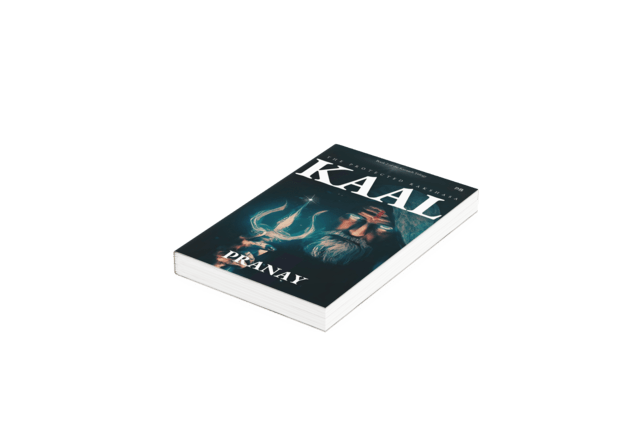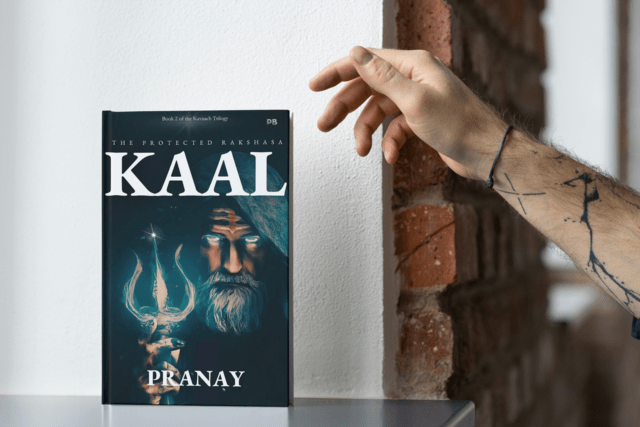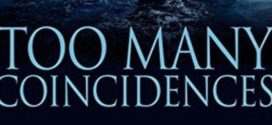Our regular readers know that we love reading thrillers, especially the ones which are a good blend of ancient and modern times, having elements of Vedic scripture and modern scientific inventions in a balanced manner.
And, when looking for a good book, we don’t discriminate between seasoned authors and newbies.
Thus, we found so many remarkable talents over the decades.
Pranay Bhalerao is one of them.
In recent past we got a chance to know about him through is book
Later we also got a chance to read his another book
Intrigued by his first book is the Kavaach Trilogy, we also took a chance to read the second book in the series. And, we found it equally fascinating.
| Book Title | : | Kaal The Protected Rakshasa Kavaach Trilogy - 2 |
| Author | : | Pranay Bhalerao |
| Published by | : | Notion Press ( 7 August 2023) |
| # of Pages | : | 370 (Paperback) 348; 1634 KB (Kindle EBook) |
| Purchase Link(s) | : |
Today, we are going to shar our thoughts about – The Protected Rakshasa KAAL.
Let us start with the cover page of The Protected Rakshasa KAAL.
This Is Here In For You
Book Cover:
By helping a book to stand-out in the display, the cover page plays a remarkable role in influencing potential readers/buyer to go for it. So, despite believing in the fact – a book should not be judged by its cover, we also acknowledge its importance.

The Protected Rakshasa Kaal By Pranay Bhalerao | Book 2: Kavaach Trilogy | Book Cover
As you can see, the cover page of this book is moderately good.
It doesn’t create the impact that the cover page of – The protectors of Kavaach.
It, however, remains true to the book title and story. As this part focuses on the story of the antagonist – Kaal. His dark persona is made visible on the cover page. This is a thoughtful decision by the designer. The jet black color has glossy finishing. And, the illustration look appealing.
It could have been better.
Storyline:
It was ancient time when there were some Mahajanpadas spread over the Bharatvarsh. There were empires associated with them and they live peacefully with small kingdoms and tribal settlements. Mahajanpadas and Empires provide security and trade opportunities to the smaller settlements kingdoms. So, it is kind of republic structures where smaller states have immediate authorities, responsibilities and control over their respective areas and they work cohesively under the wings of Mahajanpadas and empires.
In a small but important kingdom, a potter lived. He is very skillful and have mastery over art. He found an abandoned boy from the river, in a wooden box, and his fate changed from that day.
In a small kingdom, a responsible king lived with subjects peacefully. He believed in the individuals’ rights and responsibilities. His daughter was a skillful girl having mastery over many stuff.
The successor of an important Mahajanpad was getting his education at Mahant ashram and he proved himself a worthy student and a potential worthy successor of his able father.
Infertility is a taboo and is often seen as a bane. A queen-to-be is not able to have a baby faces a lot of consequences which broke her and her husband from within. They visited the city of Avanti to get blessed by Mahakaal. Sometimes, you become a prey unknowingly and unintentionally. And, sometimes you are blessed with the things you are desperate for. It is not easy to consider something good or bad, unless the consequences are seen.
A young boy, based on the genuine environment blessings of the most prominent sages of the land was not surrendering to the influence of the dark. But, till what time? Will he ultimately throw away his guard and walk the path undesired?
And, what all these incident had to do with the Kavaach and its protector? Who are on the right side and who are on the wrong?

The Protected Rakshasa Kaal By Pranay Bhalerao | Book 2: Kavaach Trilogy | Book Cover
Well, you need to read this thrilling book to know your answer. And, over the course you will meet with Sutra, Zonta, Konda (Sutra’s father), Agni, Akhanda Mahant, Shaurya, Teena, Shaksheet, Rudra, Saharshee Mahant(grandson of Akhanda Mahant), Radha, Adhiram Vashishth, Ravi, Isha Sharma, Jacob, Tanya, Swami Shankarakhanda, Priya, Kaali Pari, Krishna, Teena, Saras, Ganga, Nandini, Ishaan, Swami Vikramacharya, Sutra, Roshni, Agni, king Nandak, and others.
Views And Reviews:
The story in the book follows parallel storytelling concept. Here more than one stories are moving forward in different timelines. Most of the prominent time segment and places include the following:
- 650 BCE, 617 BCE, : Avantika Nagari (Modern Day Ujjain)
- 622 BCE, 621 BCE, 619 BCE, 617 BCE, Gondwana Empire, Avantika Mahajanpad
- 617 BCE, River Bank of Yamuna, Rajhansa Empire, Mahant Ashram
- 612 BCE, Mahant Ashram, Kurukshetra; Aryana Empire
- 610 BCE, 602 BCE, 599 BCE, 596 BCE, 595 BCE, 695 BCE, Rajhansa Empire
- 598 BCE, Somewhere in the Jungles of Kurukshetra
- 555 BCE, Om Parvat
- Present Day, Shivgarh, Maharashtra, Rann of Kutch, Gujrat.
- Chakratirtha Samshaan
Of course, not all of them are linked yet, but the author seems to be on the track and the way he linked dots of all the timelines are really remarkable. Only a talented author can do it.
The author casually introduces us to various characters while giving the needful information. For example:
Sutra, the son of the reigning king of the Gondwana Empire
– – – – – –
Zonta’s wife, Roshni,
– – – – – –
Agni, the daughter of Darshana, was a rightful princess of the small colony, the Jwalakund,
And, it works in favor of the book. Actually, when you can tell your stuff in simple words by giving enough informaiton, it’s impact is high.
Society on the whole contains both good stuff that is still relevant and outdated stuff that could have been scraped. If you don’t keep refreshing the things, the social environmnet becomes like contaminated water. The author points that out in the book:
Society blindfolded with faith and beliefs never questions the acts of the section that sponsored those blindfolds.
And, he further makers it clear.
‘I am not against our traditions. You know that. But, you could have asked me once. At least a simple question if I am ready to get married. These traditions must change according to time.’
And, for those who consider that the old civilizations were orthodox and rigid. Here is an eye-opener line:
Thus, taking the first step, we have decided to accept Agni as our daughter-in-law. As our daughter.’
See, how wholeheartedly and genuinely a new family member is welcomed! This is how it should be. Unfortunately, in modern times also, not all family possess this mindset.
And yes, there are some light moments referring to the domestic life. Eg:
‘What is that one secret to happy married life?’ asked Zonta. Sutra laughed and said, ‘Agree to whatever your wife says. Because the wife is always right.’
So, being progressive or regressive has nothing to do with the time or environment you live in. It is all about your mindset. The author moves one step ahead and applies the same rule for the position of a leader:
He worked hard and convinced them that gender is just an illusion. A leader can be any person who is truthful, confident and worthy.
The book refers to some universal truths. Eg:
…every society has a rebel. Some with good intentions, some with evil intentions.
And, it is not that only the protagonist(s) got the lime-light and good lines. The descriptions about antagonist(s) and scenes involving them are equally appealing. Eg:
The old Aghori sage started chanting the mantras in a language alien to this world.
– – – – – –
The divine Aghori coughed blood. His weak body was struggling, but his strong will kept him going.
As the book explores the time when kings, kingdoms and Janapadas were the building blocks of Bharatvarsh, the lines regarding the political scenarioss and inter-kingdom relations also found their places in the book. Eg:
Gondwana Empire was a good friend of Darshana, the head of the small settlement a few kilometres away from
– – – – – –
‘It’s important to keep the alleys happy. You never know when you need a helping hand. Build those hands, and your treasure will never go empty.’
– – – – – –
‘history always paves a way and inspiration for the future. And those inspirations may not always help this universe.’
Here are some lines from the book that I found interesting from various reasons.
‘Strength is not always the measure, Shaksheet. Sometimes the past is.
– – – – – –
Dreams with closed eyes are sometimes better than that with open eyes. It consumes a person and devours a gentleman.
– – – – – –
The human mind is mysterious, but the heart is even more.
– – – – – –
…true warrior never loses a battle if he dies. He only loose when the fear strikes so deep that the mortal body and the soul don’t have the energy to hold the weapon.
– – – – – –
Life sometimes tests patience to the limit and grants wishes, and when the person flies high with happiness, it kicks right in the face to crash everything in a blink of an eye.
– – – – – –
‘Don’t fight with fate. Everything will go on as it should. No one can change the future. We don’t have control over our past or future.’
– – – – – –
‘Respect is a big word. When people admire your work and your thoughts and think highly of you is respect. People spend their entire life to earn it. And sometimes just a moment to lose it.’
The author goes ahead and discuss about extreme emotions. Eg:
Mourning is a personal affair, but when it’s for a family, a man craves the hand of the one he loves beyond the soul and limitations.
– – – – – –
Mourning is a very personal emotion. No one can dictate the correct definition. Few people easily let go of the person and live with the memories. Some celebrate those memories. And for some, those are the catalyst for mourning.
It is not easy to lead. You have to control your emotions and do hard-work.
The sweet poison worked wonders for them, though they kept it in check to remain sober throughout the event.
– – – – – –
King Aryana rode his horse and reached the end of the land. The ocean greeted him with the waves.
The author is good at building scenes and describing surrounds. EG:
The sky roared in unison with a thunderstorm.
– – – – – –
Suddenly, the wind got stronger and warmer. The bonfire found it hard to cope with the strong wind.
If you like reading one-liners, you will find some in this book as well.
Sometimes truth leads to disaster.
– – – – – –
Immortality also has its mortality.
If I had to quote only one line from the book, I would possibly settle down for this one:
Don’t create stories if you don’t know the truth. Lies and hate propagate faster than truth and love.
Like many other Indian authors, Pranay also used words like “Anyways” in this book. However, after seeing its wide-usage, I think dictionaries should add it as a legitimate word 🙂
There are some dark scenes exploring tough times, rituals, brutality and other such stuff. So, I recommend this book to mature readers only.
The quotes above must have given you a fair idea about the story and kind of writing you will find in the book. So, based on your reading preferences you can make a choice.
There remains some stuff unanswered and a reader will surely want to see a stronger protagonist.
Summary:
A nicely written thriller that is more emotional, darker and detailed than the previous book in the series. It has some light moments, but overall, a heavy read. Linguistically, the book is really good. I liked reading it. Of course, there are some unanswered questions, and I expect them to be answered in the last and final book in the series – Trishul: The Weapon of Lord Shiva. [The Weapon of Lord Shiva TRISHUL].
ThinkerViews Rating:
Around 8 stars out of 10.
Quick Purchase Links:
- Buy - Kaal by Pranay Bhalerao - Paperback - Amazon IN
- Buy - Kaal by Pranay Bhalerao - Kindle EBook - Amazon IN
- Buy - Kaal by Pranay Bhalerao - Paperback - Amazon US
- Buy - Kaal by Pranay Bhalerao - Kindle EBook - Amazon US
Over To You:
If you already have read the book do share your remarks and thoughts via comments below. Does this review help you in making your decision to buy or read the book? Do not forget to share this article with your friends over various social networks. Please follow/subscribe us on various Social networks like Twitter, Facebook, YouTube, Spotify, Amazon Prime Music, Audible, and others. And yes, you may like to subscribe to our RSS feeds to get latest updates for the site to land right in your mail box.
 ThinkerViews – Views And Reviews Personal views and reviews for books, magazines, tv serials, movies, websites, technical stuff and more.
ThinkerViews – Views And Reviews Personal views and reviews for books, magazines, tv serials, movies, websites, technical stuff and more.



